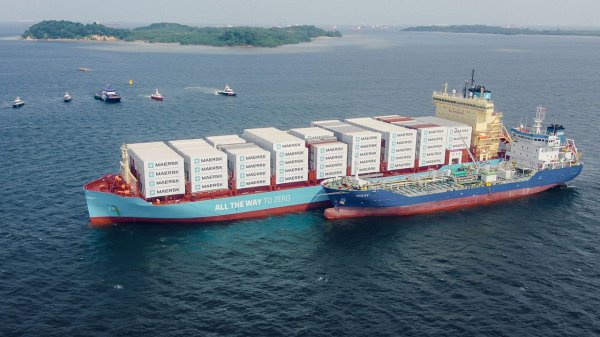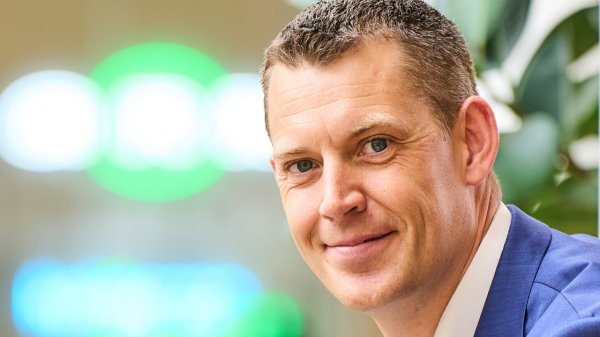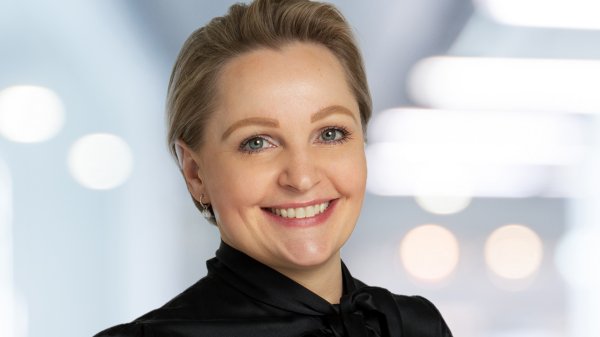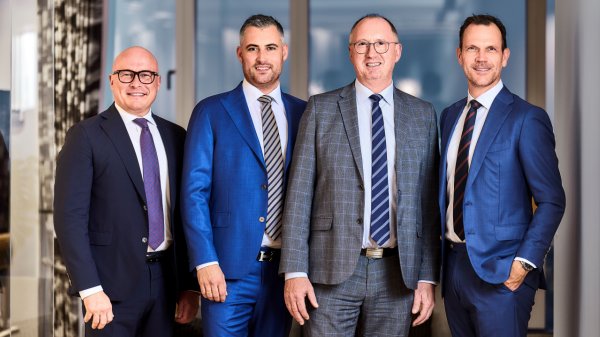Grimaldi opts for scrubbers and batteries, decides LNG retrofits 'not viable'
'Scrubbers plus batteries are the winning solution for us,' says Head of Energy Saving & Innovation.
Logistics group Grimaldi has decided that "it is not viable to retrofit existing ships to run on LNG", and instead will be combining the use of scrubbers with batteries in order to comply with upcoming sulphur cap regulations in 2020, Grimaldi's Head of Energy Saving & Innovation, Dario Bocchetti, has explained.
Bocchetti, whose department works on reducing fuel consumption and emissions across the whole Grimaldi fleet, argues that reliable infrastructure to supply gas and electricity is not available at all ports. So the company has plumped for scrubbers and batteries as its preferred option.
"Given the current situation of ships, ports, infrastructure and logistics, and given the type of ships in our fleet and the routes that they operate, scrubbers plus batteries are the winning solution for us. In fact, two of our super-large Grimaldi Lines ferries - Cruise Roma and Cruise Barcelona - will undergo extensive refitting work next January, including extensions and the installation of scrubbers and batteries," Bocchetti noted.
The Napoli-headquartered business, which specializes in the operation of roll-on/roll-off vessels, car carriers and ferries, is also looking at building ships powered solely by hydrogen, but only as a possibility for the future.
Bocchetti is responsible for the energy efficiency and innovation for more than 100 ships in the Grimaldi fleet.
Describing how the firm is constantly looking to optimise the energy consumption of its fleet, Bocchetti explained how six hybrid ro-ro vessels ordered from China's CSC Jinling Shipyard, for delivery from 2020, will be equipped with some cutting-edge technologies.
Among these are two-stroke, electronically controlled engines - offering lower consumption than four-stroke engines. Twin shaft lines and a combined rudder-propeller propulsion system will also help improve efficiency, and the hull will be optimised with a 'reverse bulb' design and a special low-friction silicon coating. Also, an air lubrication system under the keel will create a carpet of bubbles to reduce hydrodynamic resistance.
The new vessels will also be equipped with mega lithium batteries - described by Bocchetti as "the world's most powerful batteries ever to be installed on a ship".
Charged during navigation via shaft alternators and taking advantage of solar panels and a number of energy-saving devices while at sea, the batteries will be able to offer eight hours of zero-emissions power while the ships are in port.
The lithium batteries will also provide benefits during navigation through 'peak shaving' - i.e. maintaining a constant, efficient engine speed and using the batteries to make any necessary adjustments.
Grimaldi Group comprises seven main shipping companies, including Atlantic Container Line (ACL), Finnlines, Grimaldi Euromed, Grimaldi Deep Sea, Malta Motorways of the Sea (MMS) and Minoan Lines.
Last month, Finnlines ordered three hybrid ro-ro ships which will be fitted with scrubbers and a lithium-ion battery bank that can be recharged during sailing and provide the electricity to the ship while at berth.
Finnlines' EUR 70 million Energy Efficiency and Emission Reduction Investment Programme (EEERI) was launched last year; it aims to increase vessel capacity, improve efficiency and lower bunker costs via a vessel lengthening initiative.
EEERI followed the company's EUR 100 million Environmental Technology Investment Programme (ETI), which included the installation of exhaust gas scrubbers, investments in propulsion and reblading, and silicone anti-fouling, and which came to an end in April 2017.
Bocchetti, whose department works on reducing fuel consumption and emissions across the whole Grimaldi fleet, argues that reliable infrastructure to supply gas and electricity is not available at all ports. So the company has plumped for scrubbers and batteries as its preferred option.
"Given the current situation of ships, ports, infrastructure and logistics, and given the type of ships in our fleet and the routes that they operate, scrubbers plus batteries are the winning solution for us. In fact, two of our super-large Grimaldi Lines ferries - Cruise Roma and Cruise Barcelona - will undergo extensive refitting work next January, including extensions and the installation of scrubbers and batteries," Bocchetti noted.
The Napoli-headquartered business, which specializes in the operation of roll-on/roll-off vessels, car carriers and ferries, is also looking at building ships powered solely by hydrogen, but only as a possibility for the future.
Bocchetti is responsible for the energy efficiency and innovation for more than 100 ships in the Grimaldi fleet.
Describing how the firm is constantly looking to optimise the energy consumption of its fleet, Bocchetti explained how six hybrid ro-ro vessels ordered from China's CSC Jinling Shipyard, for delivery from 2020, will be equipped with some cutting-edge technologies.
Among these are two-stroke, electronically controlled engines - offering lower consumption than four-stroke engines. Twin shaft lines and a combined rudder-propeller propulsion system will also help improve efficiency, and the hull will be optimised with a 'reverse bulb' design and a special low-friction silicon coating. Also, an air lubrication system under the keel will create a carpet of bubbles to reduce hydrodynamic resistance.
The new vessels will also be equipped with mega lithium batteries - described by Bocchetti as "the world's most powerful batteries ever to be installed on a ship".
Charged during navigation via shaft alternators and taking advantage of solar panels and a number of energy-saving devices while at sea, the batteries will be able to offer eight hours of zero-emissions power while the ships are in port.
The lithium batteries will also provide benefits during navigation through 'peak shaving' - i.e. maintaining a constant, efficient engine speed and using the batteries to make any necessary adjustments.
Grimaldi Group comprises seven main shipping companies, including Atlantic Container Line (ACL), Finnlines, Grimaldi Euromed, Grimaldi Deep Sea, Malta Motorways of the Sea (MMS) and Minoan Lines.
Last month, Finnlines ordered three hybrid ro-ro ships which will be fitted with scrubbers and a lithium-ion battery bank that can be recharged during sailing and provide the electricity to the ship while at berth.
Finnlines' EUR 70 million Energy Efficiency and Emission Reduction Investment Programme (EEERI) was launched last year; it aims to increase vessel capacity, improve efficiency and lower bunker costs via a vessel lengthening initiative.
EEERI followed the company's EUR 100 million Environmental Technology Investment Programme (ETI), which included the installation of exhaust gas scrubbers, investments in propulsion and reblading, and silicone anti-fouling, and which came to an end in April 2017.

|
How to engineer and manage green shipping fuels | Stanley George, VPS
Effective management strategies and insights for evolving fuel use. |
|
|
|
||

|
Swedish government bans scrubber wastewater discharges
Discharges from open-loop scrubbers to be prohibited in Swedish waters from July 2025. |
|
|
|
||

|
MAN Energy Solutions achieves 100% load milestone for ammonia engine
Latest tests validate fuel injection system throughout the entire load curve. |
|
|
|
||

|
Petrobras secures ISCC EU RED certification for B24 biofuel blend at Rio Grande
Blend consisting of 24% FAME is said to have been rigorously tested to meet international standards. |
|
|
|
||

|
Stolt-Nielsen to fully control Avenir LNG with acquisition
Share purchase agreement to buy all shares from Golar LNG and Aequitas. |
|
|
|
||

|
Bureau Veritas supports launch of CIMC SOE's LNG bunkering vessel
Handover of Seaspan Energy's cutting-edge 7,600-cbm vessel completed. |
|
|
|
||

|
Methanol as a marine fuel | Steve Bee, VPS
How environmental legislation has driven the development of low-sulphur fuels and methanol-ready ships. |
|
|
|
||

|
Martin Vorgod elevated to CEO of Global Risk Management
Vorgod, currently CCO at GRM, will officially step in as CEO on December 1, succeeding Peder Møller. |
|
|
|
||

|
Dorthe Bendtsen named interim CEO of KPI OceanConnect
Officer with background in operations and governance to steer firm through transition as it searches for permanent leadership. |
|
|
|
||

|
Bunker Holding revamps commercial department and management team
CCO departs; commercial activities divided into sales and operations. |
|
|
|
||
Related Links
- · Finnlines orders three hybrid ro-ro ships with scrubbers [Insights]
- · Finnlines aims to slash bunker costs with new vessel lengthening initiative [Insights]
- · Finnlines exercises option to lengthen two more ro-ro ships [Insights]
- · Finnlines to fit newly acquired ship with scrubbers [Insights]
- · Finnlines lengthens first vessel in new fuel efficiency programme [Insights]
- · Italy [Directory]

